As a doctor, have you ever had a patient who was overjoyed after a successful procedure only to return crestfallen a few weeks later upon receiving an exorbitant bill?
Or have you, as a patient, left a hospital visit feeling relieved and assuming your insurance would cover the costs, only to be stunned by an enormous charge shortly thereafter?
If so, you’ve been victimized by the scourge of “SURPRISE MEDICAL BILLS,” also known as balance bills. When a patient receives emergency treatment from an out-of-network provider at an in-network facility, balance billing occurs.
To remedy this, the No Surprises Act was passed in 2022 to protect patients from unexpectedly high medical bills when they receive emergency care or are treated by an out-of-network doctor at an in-network hospital.
This Act limits how much patients have to pay out of pocket for emergency treatment or when they see an out-of-network doctor at their usual in-network hospital. The Act comes up with this limit by using the average fee for the service in that area.
For example, say a guy goes to his local hospital for a broken arm, but the orthopedic who sees him isn’t in his insurance network. Without this law, that orthopedic physician could charge this patient a massive bill. But under the No Surprises Act, the orthopedic can only charge this patient the average amount for setting a broken arm in that town.
What is Surprise Medical Billing?
Surprise Medical Bills happen when a patient receives services from a healthcare provider or facility that the patient didn’t know was out-of-network. This means that the provider or facility hadn’t negotiated a reimbursement rate with the patient’s insurance company, leaving the patient to pay the bill.
For example, let’s say a patient had an emergency or scheduled a visit at their in-network facility. However, they’re mistakenly treated by an out-of-network provider at their in-network facility. This results in a surprise medical bill that the patient wasn’t anticipating.
Since a patient’s health insurance does not cover the entire out-of-network cost, this leaves the patient owing the difference between the out-of-network provider’s bill and the amount the patient’s health insurance paid. This is referred to as “balance billing.” It’s common for services like anesthesiology or laboratory tests because patients often don’t choose those doctors themselves.
Balance Billing = [Full Amount of Medical Bills – Amount paid by Insurance Provider].
Maybe it’s an emergency, or the only provider for miles. However it shakes out, sometimes patients find themselves unable to dictate where and from whom they receive medical treatment. It is during these times that they often end up seeking care from a doctor that happens to be out-of-network.
Unfortunately, when an insurance company and an out-of-network healthcare provider engage in a dispute over the bill for a patient’s care, they frequently shift the burden onto the patient instead of reaching a resolution. As a result, the patient is then faced with an unexpected bill called the “Surprise Medical Bill” that includes hefty charges for out-of-network services, in addition to the regular deductible or copay.
Why Do We Call Them “Surprise” Medical Bills?
You go into the hospital expecting to pay your standard fees, but then wham, a surprise medical bill hits you.
Why do they call it a “surprise“?
Because patients usually don’t see these bills coming.
Here’s how it happens:
A person chooses an in-network hospital and doctors, so he knows what he’s in for cost-wise. But during his treatment, without him realizing it, some out-of-network specialist gets called in. Could be an anesthesiologist during surgery or an ER doctor. The patient had no control over who provided that care, but now he’s stuck with their huge bill.
Even though the person did everything right by using in-network providers, he still got blindsided by fees he never expected. That’s why surprise medical bills are called surprises. They financially-shock patients with unforeseen costs through no fault of their own.
Why Do Surprise Medical Bills Happen?
Imagine opening your mailbox and finding a medical bill for thousands of dollars that you never budgeted for or agreed to pay. Unfortunately, this is a reality for too many patients. Let’s break down the primary causes of these unfair Surprise Bills in medical billing:
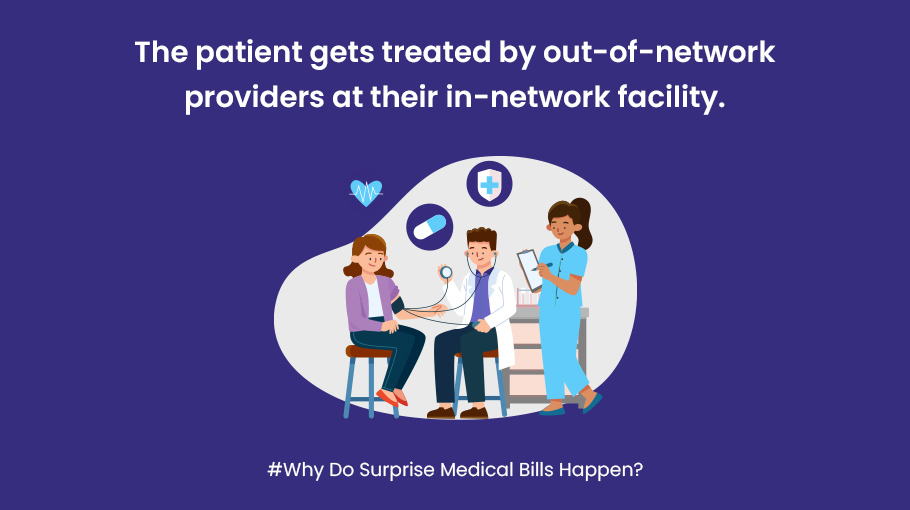
1). The patient gets treated by out-of-network providers at their in-network facility.
Many healthcare practices are in-network with insurance companies, but they often employ specialists like pathologists, radiologists, anesthesiologists, and others who are out of network.
The issue arises when a patient is seen by an out-of-network doctor, like an anesthesiologist or radiologist, even though the patient went to an in-network facility. These out-of-network doctors can charge the patient whatever they like, and the patient’s insurance may cover only part of the bill, leaving the patient on the hook for the rest. The out-of-network doctors have no contract with the patient’s insurance, so there are no negotiated rates, and they can bill the patient for the full “list price” of their services.
For example, say a patient goes to their in-network hospital for a scheduled surgery with their in-network surgeon. However, the anesthesiologist who handles the patient’s anesthesia during the surgery is out of their insurance network. Even though the patient chose an in-network facility and surgeon, he may end up with an unexpected bill for thousands of dollars from the out-of-network anesthesiologist that his insurance won’t fully cover.
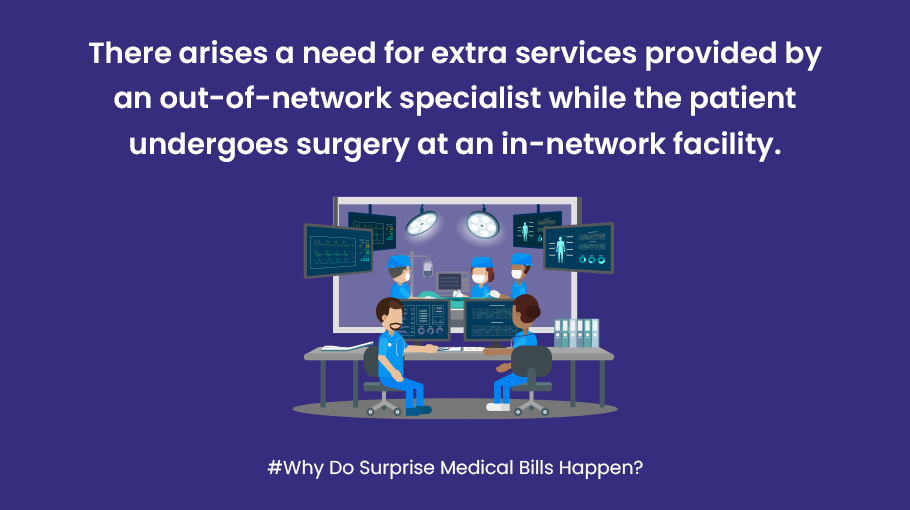
2). There arises a need for extra services provided by an out-of-network specialist while a patient undergoes surgery at an in-network facility.
Surprise medical bills can happen when there are complications during a patient’s surgery or if the patient needs additional care from out-of-network specialists that their main doctor calls in to assist.
For example, say a patient goes to his local hospital for a routine hip replacement surgery. The surgeon and anesthesiologist are in the patient’s insurance network, but if there are complications like excessive bleeding or a bad reaction to the anesthesia, the doctor may need to call in a vascular surgeon or cardiologist who is out-of-network to get the situation under control.
Even though the patient did nothing wrong, the services provided by the out-of-network clinician can cost him thousands in surprise bills.
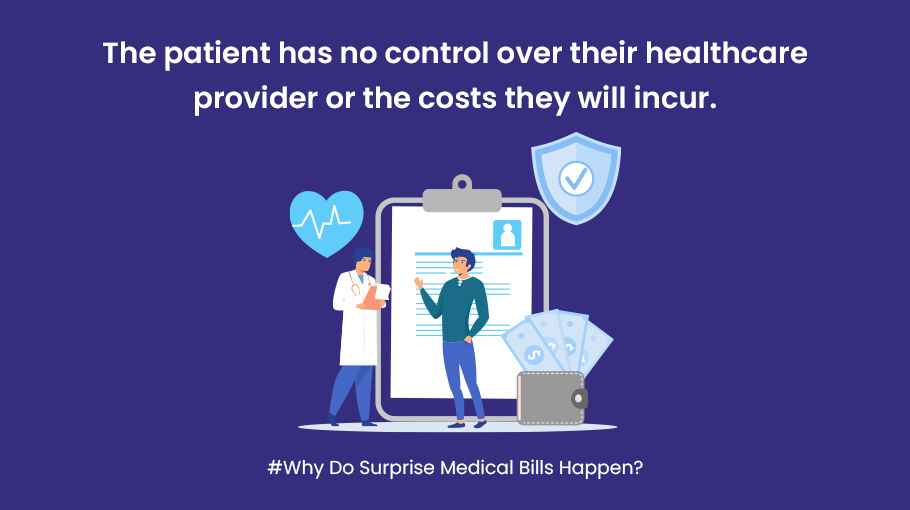
3). The patient has no control over their healthcare provider or the costs they will incur.
Fate has a way of dealing us a bad hand when we least expect it. Surprise medical bills show up in the mailbox as an ugly reminder of this truth.
You go about your day never imagining that suddenly you’ll end up in an ambulance, being treated by whoever happens to be on call at the hospital that’s closest whether or not they are in-network providers. The costs of emergency care are out of your control but the bills will still come due.
For instance, picture yourself enjoying your usual three-mile jog when out of the blue you drop to the ground clutching your chest in pain. The paramedics rush you to the nearest emergency room where the first available cardiologist, a stranger, puts a stent in to save your life. Though you’d never choose a doctor outside your network or consent to their fees, here you are stuck with this doctor’s huge bill for lifesaving measures you couldn’t refuse. There was no way to prevent or foresee this distressing situation—surprise bills are the unlucky outcome.
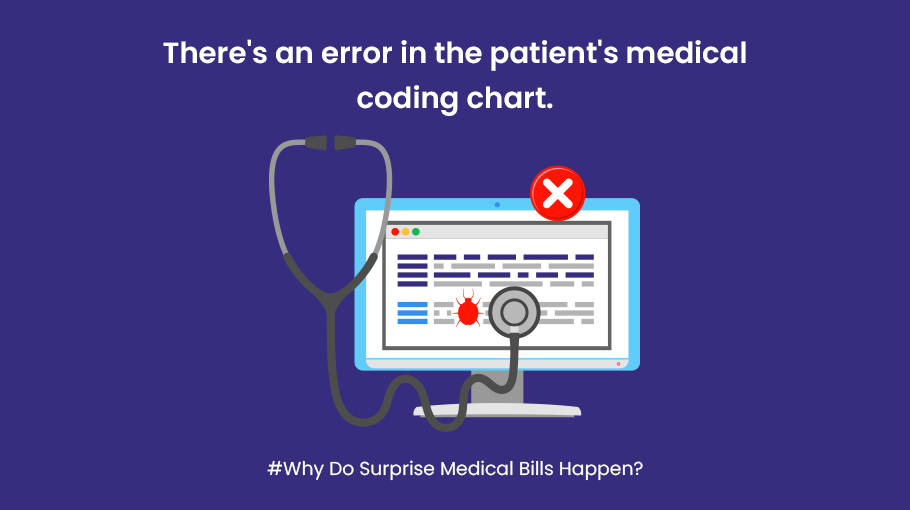
4). There’s an error in the patient’s medical coding chart.
Surprise medical bills can come about due to mistakes made in the complex process of medical billing and coding. You see, when you receive treatment, the doctors and hospitals have to translate the particular services into codes to submit to your insurance company. Sometimes, errors are made in selecting or entering those codes, which can lead to surprise bills for costs you didn’t expect to pay.
For example, say you go to the emergency room with abdominal pain. The doctor orders a CT scan to check things out. A few weeks later, you get a bill for $500, the portion insurance didn’t cover. Turns out the CT scan code submitted was for a higher-cost procedure than the standard scan you actually received.
How Does The No Surprises Act Save Patients From Surprise Medical Billing?
The No Surprises Act is a piece of legislation passed in January 2022 under the Trump administration. It is aimed at protecting patients from being saddled with exorbitant medical bills when receiving care from out-of-network providers. President Biden has upheld the policy since taking office, much to the chagrin of some physicians and hospitals.

In a nutshell, the law requires insurers and providers to negotiate payment rates amongst themselves for out-of-network care. Should they fail to reach an agreement, the dispute enters arbitration where an independent mediator will determine a fair price.
The crux of these negotiations and the entire No Surprises Act boils down to the almighty dollar. Each party wants to secure the highest or lowest payment possible, depending on which side of the equation they fall.
To guide the independent arbitration process, the law establishes a benchmark price known as the Qualifying Payment Amount (QPA). This represents the median in-network rate for that service in a specific geographic region. In theory, this QPA promotes a balanced middle ground.
For example, let’s say the CPT code for an MRI of the lumbar spine is 72148. An out-of-network MRI facility might try to charge $4,800 for that scan. However, the QPA for that MRI would likely be closer to $1,200 – a quarter of what they were trying to bill.
Understandably, many physician groups take issue with the QPA. They argue it essentially forces out-of-network providers to accept painfully low reimbursement rates comparable to in-network contracts they never consented to.
Doctors claim the QPA disincentivizes going out-of-network, stifling competition and giving insurers even more leverage to restrict payments. Patients may suffer if providers opt out of networks altogether or become reluctant to take on complex, costly cases.
So while the No Surprises Act shields patients from budget-breaking bills, the debate continues around QPA benchmarks and potential unintended consequences. The tussle over out-of-network payment rates will likely persist as a point of contention between insurers and providers.
Who Is Eligible For The No Surprises Act?
The No Surprises Act aims to protect patients with private insurance from receiving three different types of surprise medical bills.
➜ Firstly, the No Surprises Act shields patients from out-of-network surprise medical bills by hospitals or surgery centers, which arise when a facility is not covered by the patient’s insurance plan. These inflated invoices frequently stem from emergency situations when the patient cannot verify network participation beforehand.
➜ Secondly, the No Surprises Act defends patients if a doctor unchosen by the patient handles their surgery or procedure and happens to be out-of-network. This often occurs when supplementary providers like anesthesiologists or radiologists are needed.
➜ Thirdly, protection applies if a patient needs to be transported by an air ambulance that is out of network. Air ambulances are often the only way to get critically ill or injured patients to hospitals that can properly treat them, even if that hospital is out of network.
With the No Surprises Act, the patient will no longer receive massive bills for out of network emergency care, doctors, or air ambulance rides. Instead, the patient’s insurance company and the hospitals will have to work together to make sure the patient is only charged standard in-network rates.
Who Is Not Eligible For The No Surprises Act?
The No Surprises Act has been a hot topic in the healthcare industry lately, but it’s important to understand that it doesn’t necessarily mean the end of large medical bills for patients.
While the act does provide protection against surprise medical bills, the following are still some types of bills that won’t be covered.
- If a patient takes a ground ambulance to the hospital, that won’t be covered under the No Surprises Act.
- If a patient goes to a different type of facility that isn’t a hospital or surgery center, like a birthing center or addiction treatment facility, they could still receive a surprising medical bill that isn’t covered by the act.
It’s worth mentioning that patients may still receive unexpected medical bills due to other reasons apart from the limitations of the No Surprises Act. For example, if their insurance company makes an error like not having the correct information on file, patients may still be accountable for additional charges. Similarly, if a patient has a high deductible, which is the amount they pay before their insurance kicks in, they may find themselves responsible for more of the cost than they anticipated.
Despite these limitations, the federal government estimates that the No Surprises Act will protect against 10 million surprise bills a year, which is certainly a step in the right direction. While it may not solve every problem related to medical billing, patients can take heart in the fact that they are now better protected against some of the largest and most unexpected bills that can arise in the healthcare industry.
What To Do If You Receive Surprise Medical Bills?
If you are a patient who unexpectedly receives a surprise medical bill in the mail, the first thing you should do is determine whether or not that bill is lawful according to the new government legislation.
The new law, which came into effect on 1st January 2022, protects individuals who have health insurance through their employer or healthcare marketplace, or those who purchased private insurance directly from an insurance company.
The law states that insurance companies must cover any out-of-network services incurred after receiving emergency or routine medical care at in-network facilities, as well as all air ambulance transport, as though they were in-network services.
In short, this means you cannot be billed for more than you are accustomed to paying for in-network services. Any bills requesting additional payment are illegal.
If the bill you received is for out-of-network services performed at an in-network hospital, for emergency services, or for air ambulance transport, you should not pay anything beyond your typical in-network cost-sharing amount, such as co-pays and deductibles. You should contact your insurance company and the healthcare provider that sent you the bill to report the unlawful charge. Provide details about the new legislation protecting patients from surprise medical bills in these situations.
Your insurance company and the provider are required to comply with the new law. If needed, you may have to reiterate your rights and the obligations of insurance companies and healthcare providers under this legislation until the issue is resolved appropriately. No patient should have to pay an unlawfully high medical bill due to confusion over this new rule.
What Does The No Surprise Billing Protection Law States? (2024 Updated)
This federal law shields patients from some unexpected healthcare costs. Let’s explore what this federal law does to protect patients from unexpected healthcare fees:
In a nutshell, it bars hospitals and doctors from billing you directly for things like: out-of-network care you unknowingly got at an in-network facility, or fees above your plan’s allowed limit for a covered service. Now any billing disputes have to be handled between providers and insurers behind the scenes – you pay only your normal copays, coinsurance and deductibles. The law also requires clear upfront cost estimates so you can avoid surprise fees down the road.
1). The No Surprise Bill Protection puts an end to unexpected medical charges for emergency care.
Even if the patient ends up getting treated by an out-of-network doctor in an emergency, without first getting the OK from his insurance, he won’t get stuck with a big surprise bill afterwards. The insurance companies and hospitals will have to work it out between themselves.
2). Patients can receive emergency treatment or scheduled non-emergency care without out-of-network charges.
The new law on surprise medical bills has also put an end to unexpected charges for emergency care and some non-emergency treatments. If your insurance doesn’t cover the full cost and you end up seeing an out-of-network doctor, you won’t pay any more than you would for an in-network provider. No more surprise coinsurance or copayments that can amount to hundreds or even thousands of dollars.
3). Forbids out-of-network providers from balance billing patients who received care at an in-network hospital or clinic.
When a patient goes to a hospital or clinic that is in his insurance network for a procedure, he expect all the doctors and services to also be in that network. However, some specialists like anesthesiologists or radiologists are often out-of-network. They can then send the patient large bills that the patient’s insurance won’t cover, leaving him on the hook for the costs. The No Surprise Bill Protection Act makes these “balance bills” illegal and ensure patients are only responsible for in-network costs even when some providers are out-of-network.
4). Patients should receive an itemized statement of their rights and protections before any treatment commences.
The new surprise medical billing law 2024 also provide patients protections that their doctor or hospital must clearly explain. Before any treatment, patients will receive a straightforward notice detailing their rights, who to call if those rights are not respected, and that waiving those rights requires the patient’s consent. No patient can be blindsided by out-of-network charges without agreeing to them first.
How To Dispute Surprise Medical Bills?
Surprise medical bills can leave you feeling helpless and overwhelmed. However, there are steps you can take to dispute these unfair charges. Below, I’ll share five of the best methods for contesting a surprise medical bill quickly, so you can find a resolution and move on.
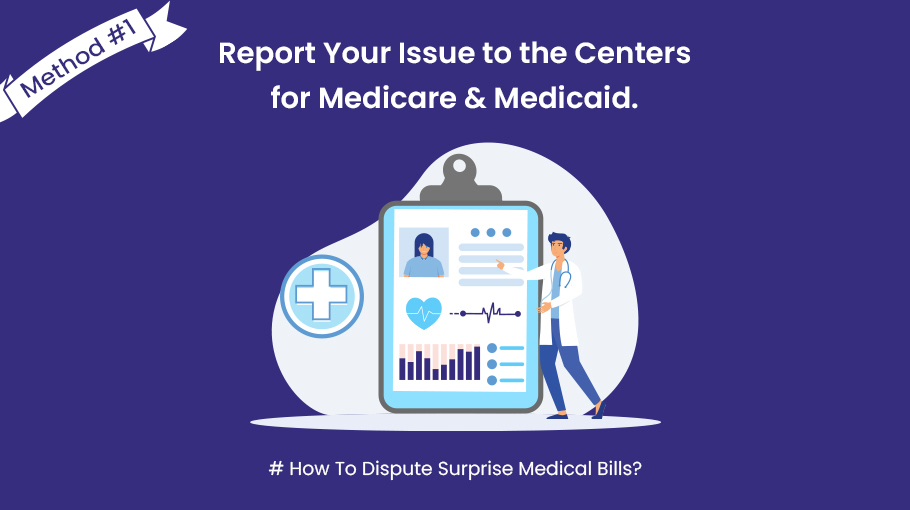
Method #1 – Report Your Issue to the Centers for Medicare & Medicaid.
The Centers for Medicare & Medicaid Services has set up a hotline to help patients dispute surprise bills and report issues with their coverage. Give them a call, provide details about your charges and insurance policy, and let them examine the situation. They have the authority to hold insurance companies accountable and may be able to get your bill reduced or dropped altogether.
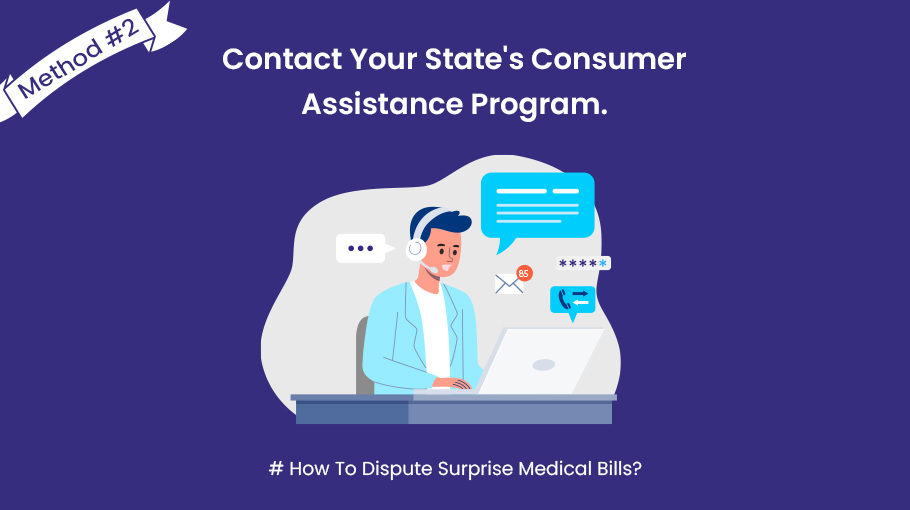
Method #2 – Contact Your State’s Consumer Assistance Program.
Another effective way to dispute Surprise Medical Bills is contacting your state’s consumer assistance program. These helpful organizations are set up to shield citizens from predatory practices. They have the knowledge and experience to challenge improper charges on your behalf.
Call your state’s program and explain the situation. They will review the details to ensure you were charged properly according to the law. If the fees seem unjustified, they will contact the healthcare provider and insurance company to dispute the bill on your behalf. More often than not, they are able to reduce or eliminate the charges altogether. These programs level the playing field so you don’t have to face big business alone.
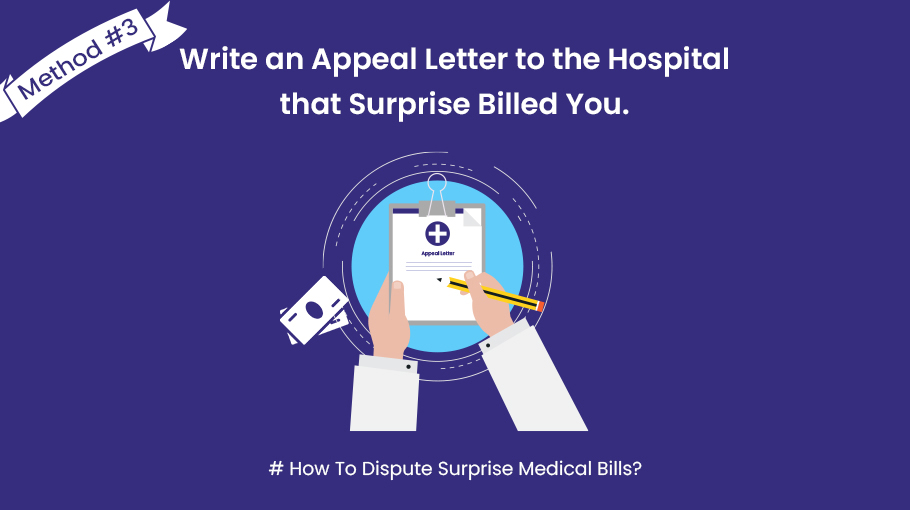
Method #3 – Write an Appeal Letter to the Hospital that Surprise Billed You.
The most reasonable way to dispute surprise bills is to tell the hospital that they made a mistake. Write them a letter explaining that their bill violates the No Surprises Act. Tell them you need this fixed immediately or you’ll have no choice but to report them to the authorities.
Since, the hospital can face huge fines up to $10,000 for violating patient protection laws. So the chances are good the hospital will rush to remedy their error once they realize their blunder. They’ll likely apologize profusely and withdraw the erroneous charges to avoid the headache of a formal complaint and government penalties.
This approach is an effective way to defuse the surprise bill situation without prolonged hassle or expense.
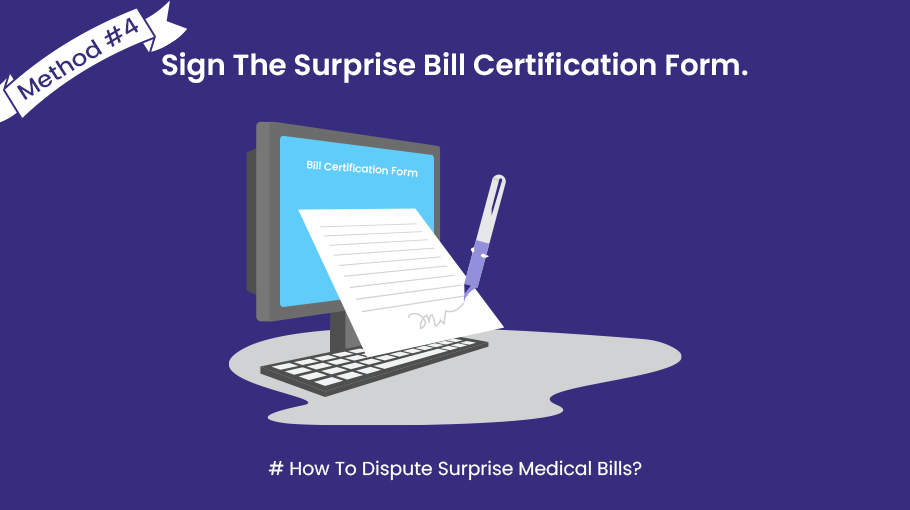
Method #4 – Sign The Surprise Bill Certification Form.
Another way to dispute a surprise medical bill is to sign what they call a Surprise Bill Certification Form. If your regular doctor sent you to a doctor outside of your insurance network, or if a doctor outside your network treated you at your in-network hospital, you are eligible to sign this form.
Although as of January 1st, 2022, this form isn’t needed for treatment at an in-network hospital or outpatient surgery center, the Department of Financial Services still recommends submitting it in 2024. It’s a way to fast track your appeal and resolve those surprise bills.
Once you’ve filled out the form, send it to your health plan and the doctor who billed you. Include copies of the surprise bills you don’t think you should have to pay.
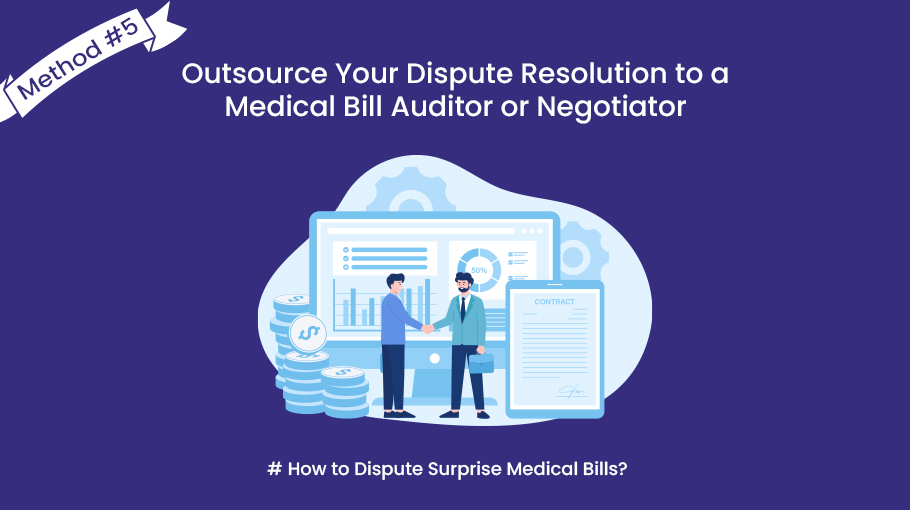
Method #5 – Outsource Your Dispute Resolution to a Medical Bill Auditor or Negotiator.
There’s a simple, foolproof way to contest unexpected medical bills, and that’s hiring a medical bill auditor or negotiator.
For a percentage of the costs they cut, they’ll scrutinize your bills for errors, bargain with healthcare providers and insurers, and challenge any rejections. They know the ropes and have the skills to slash fees or scrap them altogether.
If an easy, hassle-free solution is what you want, look no further. This approach can’t be beat.
How To Dispute Medical Bills Not Covered By The No Surprises Act?
When it comes to medical bills, surprises are rarely pleasant. Unfortunately, some medical bills may not be covered by the No Surprises Act. These can include bills for ground ambulance services, medical care provided by out-of-network urgent care centers that are not licensed to provide emergency services, and some tests processed by out-of-network labs. Additionally, consumers may still be responsible for paying for non-emergency care provided by out-of-network hospitals.
If you find yourself facing a medical bill that isn’t covered by the No Surprises Act, there are steps you can take to dispute it.
The best way to start is by asking the medical provider for an itemized bill that includes billing codes describing the care you received. This can help you to verify whether the codes accurately describe the care you received and can also allow you to compare the amount charged for each code with what health insurance companies say is a reasonable amount to charge.
By looking up the approximate procedure code charges on hospital websites or on the website of the nonprofit organization Fair Health Consumer, you can get a better idea of what you may be responsible for paying.
While this may not completely dispute the surprise bill, it can help you to reduce what you owe.
How to Dispute Surprise Medical Bills If You Have Employer/Union Self-Funded Coverage?
If you find yourself facing an unexpected medical bill and have employer or union self-funded coverage, the proper way to dispute it is via the Independent Dispute Resolution (IDR) process.
It’s worth noting that the type of payment dispute you’re dealing with will determine your eligibility for filing an IDR or seeking protections under the Federal No Surprises Act through CMS. Depending on the situation, you may fall into one category or the other.
If you happen to be eligible under the Federal Process, here’s some good news: you won’t need to file for IDR through New York State. There’s no need to go through additional steps if you’re already covered by federal protections.
However, for those patients with employer or union self-funded coverage who are indeed eligible to submit a dispute through New York State, there’s a simple process to follow.
You must complete an IDR Patient Application and then send it via mail to the New York State Department of Financial Services at the following address:
New York State Department of Financial Services
Consumer Assistance Unit/IDR Process
One Commerce Plaza, Albany, NY 12257
Can I Dispute My Surprise Medical Bills As a Self-Pay or Uninsured Patient?
If you’re paying for your own medical care out of your own pocket without the help of insurance, the No Surprise Billing Act does not apply to your situation, unfortunately.
But don’t lose hope.
As a self-pay patient, you can still get an estimate of what your treatment might cost before the doctor lays a hand on you. It’s called the Good Faith Estimate or GFE for short. The GFE lets you know what you’re in for moneywise so you’re not caught unawares by a whopper of a bill after the fact.
Say your final bill comes out $400 or more above the GFE. You’ve got 120 days from the bill date to dispute those charges. To dispute, you’ll need to contact the healthcare provider in writing. Explain why you think the charges are too high compared to the GFE. Provide copies of the GFE and final bill. Ask them to lower the bill to match the estimate. If they refuse, you may need to get insurance or an attorney involved.
FAQs
I am in-network. Why did I get a bill from an out-of-network provider?
Even if you go to an in-network facility, surprise medical bills can happen, potentially leading to significant financial strain. This is because some providers within the facility, like anesthesiologists or radiologists, might be out-of-network and can bill you separately for their services at a much higher rate than your insurance negotiates with in-network providers.
What’s the difference between surprise billing and balance billing? Are they the same?
Surprise billing and balance billing are closely related but with a slight difference. Surprise billing refers to the unexpected charges patients receive from an out-of-network provider patients didn’t know about beforehand. Balance billing is the difference between the provider’s total charge and what your insurance company pays is equal to balance billing.
Provider Total Charge – What Insurance Pays = Balance Billing
Isn’t there a law against surprise medical bills?
The No Surprises Act, enacted in 2022, offers some protection from surprise bills, providing a safety net for patients. However, it’s essential to be aware of its limitations. For example, it doesn’t apply to out-of-network ground ambulance services or bills you receive for care outside your insurance plan’s network (if you choose to go out-of-network knowingly).
Do surprise medical bills only happen in clinics? What about urgent care centers or ambulance services?
Surprise bills can occur in various settings beyond hospitals. For example, urgent care centers and even ambulance services, particularly air ambulances, can employ out-of-network providers that can charge you with surprise. It’s essential to know these potential scenarios and understand their financial implications.
That Big Medical Bill Got You Down? Don’t Pay… We Can Help You Right Now!

When a massive hospital bill shows up in your mailbox, it’s enough to make your blood pressure skyrocket. How did a standard test or procedure turn into a four-figure debt? Unfortunately, errors and overcharges are common in medical billing. The good news is, you don’t have to pay that outrageous amount.
ProcareMedex Medical Billing Company has a team of billing experts who will conduct an in-depth audit of your bill to uncover any mistakes or unjustified charges. Then we’ll negotiate with your insurance company and healthcare providers to lower the total to a fair amount. If they refuse to budge, we’ll appeal on your behalf and take the dispute to an independent mediator.
We handle the whole messy process so you don’t have to. You can finally stop stressing about that huge bill looming over your head. Our goal is simple: to lower your costs as much as legally possible so you pay what you actually owe and nothing more. With our help, that surprise bill won’t be so surprising after all.





